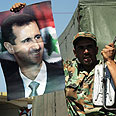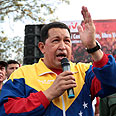

Syrian army units deployed in a seaside Mediterranean city rocked by protests and unrest, eyewitnesses and activists said Sunday.
They told The Associated Press that troops in army vehicles entered Latakia at night following a day of violence and chaos in which protesters and the government traded accusations of violence and incitement.
They spoke Sunday on condition of anonymity for fear of reprisal.
The government on Saturday said armed groups had attacked people in the religiously mixed resort city, adding that at least two people were killed by rooftop snipers.
Protesters accused government forces of opening fire on them. Activists said some demonstrators burned tires, attacked businesses and set fire to an office of the ruling party Saturday.
Ammar Qurabi, an exile in Egypt who heads Syria's National Organization for Human Rights, said dozens of people protested in Latakia before attacking the Baath party's offices in Latakia.
Home to some half a million people, Latakia is a mix of Sunnis in its urban core, Alawites living in villages on the outskirts, and small minorities of Christians, ethnic Turks and other groups.
Demonstrators on Saturday also attacked a police station and offices of the Baath party in the town of Tafas, six miles (10 kilometers) north of the southern border city of Daraa, the epicenter of more than a week of anti-government protests.
An activist in Daraa told AP Sunday that up 1,200 people were still holding a silent sit-in the al-Omari mosque, at the center of the protests there.
He said the army and police were surrounding the area in a tense standoff with the protesters, but reported no violence. "I think they will storm our sit-in very soon," he said on condition of anonymity.
'Yankees come in to bomb'
The spread of violence to ethnically mixed Latakia had special significance, and President Bashar Assad's government of minority Alawite Muslims blamed a major Sunni cleric in Qatar for inciting the unrest.
Presidential adviser Bouthaina Shaaban said Qatar-based Sheik Youssef al-Qaradawi had incited Sunnis to revolt with his sermon in Doha on Friday. Al-Qaradawi, who has millions of followers around the world and is seen as one of most influential voices in Sunni Islam, praised the Syrian uprising and criticized the regime.
Shabaan said those words were responsible for the unrest in Latakia.
"There was nothing (in Latakia) before Qaradawi's sermon on Friday," she told reporters in Damascus Saturday. "Qaradawi's words were a clear and honest invitation for sectarian strife."
Sectarian divisions are a deeply sensitive topic in Syria, where Assad has used increased economic freedom and prosperity to win the allegiance of the prosperous Sunni Muslim merchant classes, while punishing dissenters with arrest, imprisonment and physical abuse.
Assad has placed his fellow Alawites, adherents of a mystical offshoot of Shiite Islam, into most positions of power in Syria. He has built a close relationship with Iran, allowing the Shiite powerhouse to extend its influence into Lebanon, where it provides money and weapons to Hezbollah militants.
Meanwhile, Venezuelan President Hugo Chavez said the US was plotting to topple Assad in order to loot Syria's resources.
The attack on Syria has begun, there have been some supposed peaceful protests and some deaths (...) and they are accusing the president (Assad) of killing his people," AFP quoted Chavez as saying on Saturday at a political event.
"And then the Yankees come in to bomb the people in order to save them. What cynicism on the empire's part," he noted.
Chavez said he had spoken with his "brother" Assad on Friday and describes the Syrian leader as a "humanist, a doctor who was educated in London – he is not an extremist in any way."
AP, AFP contributed to the report
- Follow Ynetnews on Facebook















